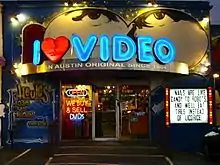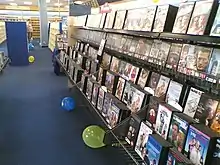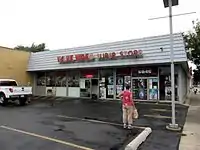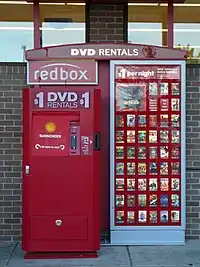Video rental shop
A video rental shop/store is a physical retail business that rents home videos such as movies, prerecorded TV shows, video game discs and other content. Typically, a rental shop conducts business with customers under conditions and terms agreed upon in a rental agreement or contract, which may be implied, explicit, or written. Many video rental stores also sell previously-viewed movies and/or new unopened movies.


In the 1980s, video rental stores rented VHS and Betamax tapes of movies, although most stores dropped Beta tapes when VHS won the format war late in the decade. In the early 2000s, video rental stores began renting DVDs, a digital format with higher resolution than VHS. In the late 2000s, stores began selling and renting Blu-ray discs, a format that supports High Definition.
Widespread adoption of video on demand and video streaming services such as Netflix in the 2010s sharply reduced most major rental chains' revenue, leading to the closure of many locations. Due to significantly less demand, few rental shops have survived into the present day.

History
The world's oldest business that rents out copies of movies for private use was opened by Eckhard Baum in Kassel, Germany in the summer of 1975. Baum collected movies on Super 8 film as a hobby and lent pieces of his collection to friends and acquaintances. Because they showed great interest in his films, he came up with the idea of renting out films as a sideline.[1] Over the years, videotapes and optical discs were added to the range. Baum still operates the business as of September 2015[2] and was portrayed in the June 2006 documentary film Eckis Welt by Olaf Saumer.[3]
The first professionally managed video rental store in the U.S. was opened by George Atkinson in December 1977 at 12011 Wilshire Boulevard in Los Angeles. After 20th Century Fox had made an agreement with Magnetic Video founder Andre Blay to license him 50 of their titles for sale directly to consumers, amongst them Butch Cassidy and the Sundance Kid, M*A*S*H, Hello, Dolly!, Patton, The French Connection, The King And I and The Sound Of Music, Atkinson bought all the titles in both VHS and Beta formats, and offered them for rent.[4][5][6] Such stores led to the creation of video rental chains such as West Coast Video, Blockbuster Video, and Rogers Video in the 1980s.
Sony released their first commercially available video recorders in the United States on June 7, 1975,[7] and the following year, on October 25, 1976, Universal and Disney filed a lawsuit against Sony in the case known as Sony Corp. of America v. Universal City Studios, Inc.. The two studios tried to ban the sales of VCRs, and later the rental of movies, which would have destroyed the video rental business in the US. Justice Harry Blackmun sided with the studios, while Justice John Paul Stevens ruled in Sony's favor. Eventually, on January 17, 1984, the Supreme Court overruled the U.S. 9th Circuit Court of Appeals after Justice Sandra Day O’Connor changed her mind, leading to a 5-to-4 ruling.[8][9][10][11]
By mid-1985, the United States had 15,000 video rental stores, and many record, grocery, and drug stores also rented tapes.[12] By May 1988, the number of video specialty stores was estimated to be 25,000, in addition to 45,000 other outlets that also offered video rentals. Groceries rented tapes for as little as $0.49 as loss leaders.[13] The press discussed the VCR "and the viewing habits it has engendered — the Saturday night trip down to the tape rental store to pick out for a couple of bucks the movie you want to see when you want to see it".[14] Video rental stores had customers of all ages and were part of a fast-growing business. By 1987, for example, Pennsylvania had 537 stores that primarily dealt in renting videotapes, with annual spending per resident of $10.50. Six years after its founding, Philadelphia's West Coast Video had by 1989 come to operate more than 700 stores in the US, Canada, and Britain.[15] Also in 1987, the revenue taken in from the home video market surpassed box office revenues for that year.[16]
.jpg.webp)
In the 1980s, it was common for shops to rent equipment—typically VHS recorders—as well as tapes. Some video shops also had adults-only sections containing X-rated videos. To cope with the videotape format war of the 1970s and 1980s, some stores initially stocked both VHS and Betamax cassettes, while others specialized in one format or the other. During the 1980s most stores eventually became all-VHS, contributing to the eventual demise of Beta. In the late 1990s, DVDs began appearing in video rental stores. Rogers Video was the first chain to provide DVD rentals in Canada. Other chains and independent stores later transitioned to the newer format. Similarly, many stores now rent Blu-ray Disc movies after the high definition optical disc format war was finished in the late 2000s decade.

The widespread availability of video on demand (VOD) on cable TV systems and VHS-by-mail services offered consumers a way of watching movies without having to leave their home. With the advent of the World Wide Web, Internet services such as Netflix have become increasingly popular since the mid–2000s. All of these new ways of watching movies have greatly reduced the demand for video rental shops, and many have closed down as a result.[17][18][19] In 2000, there were 27,882 stores open,[20] and in late 2015, it down to 4,445.[21] In 2017, it was reported that about 86% of 15,300 video stores that were open in the US in 2007 were closed, bringing the number down to about 2,140 remaining stores.[17] The total income from brick and mortar rentals for 2017 was about $390 million.[22]
In mid-June 2020, Malaysian video rental chain Speedy Video closed its 14 remaining shops in response to competition from satellite television and streaming platforms.[23][24]
On January 5, 2021, Glenview, Illinois based Family Video announced it was closing all of its remaining video rental stores.[25] Family video was the last remaining nationwide video rental chain in the United States and its closing marked the end of large scale video rental stores.
Rental and copyright
The rental of books, CDs, tapes, and movies is covered by copyright law.[26] Copyright owners sometimes put warning notices on the packaging of products such as VHS cassettes to deter copyright infringement. In some cases, the rights of consumers in Europe and the US are in fact significantly broader than described in such warnings.
Companies
- Blockbuster
- Blockbuster Express rental kiosks
- Civic Video (Australia, Canada, New Zealand and Thailand)
- Culture Convenience Club (Japan and Canada)
- Discount Drug Mart (United States)[27]
- DVDXpress rental kiosks
- Family Video (United States and Canada)
- GEO (Japan)
- Hastings Entertainment (United States)
- Hoyts Kiosk (Australia)
- Jumbo Video (Canada)
- Microplay (Jumbo Video's game-focused stores)
- Le SuperClub Vidéotron (Quebec, Canada)
- Major Video (United States)
- Movie Gallery (United States and Canada)
- Hollywood Video (United States)
- GameCrazy (Movie Gallery's game-focused stores)
- Video Update (United States and Canada)
- Movies to Go, Iowa (acquired by Moovies, Inc., Greenville, SC - ceased operations in 1997) (United States)
- Redbox rental kiosks
- Rogers Video (Canada)
- Speedy Video Distributors (Malaysia)[23][24]
- That's Entertainment Canada Canada's Largest Video Store - St. Catharines, Ontario
- Top Hat Video (United States)[28]
- United Video (New Zealand)[29]
- Video City (Northern Ireland and Canada)
- Video Ezy stores and kiosks (Australia, New Zealand, Canada, and Thailand)
- Videoland (Netherlands)
- West Coast Video (United States, Canada, and Peru)
- Xtra-vision (Ireland and Canada)
Gallery
See also
Footnotes
- Schmid, Von Dorina (14 February 2014). "Meine Videothek ist ein Kulturerbe – Gespräch mit dem Erfinder der ersten Videothek der Welt: Eckhard Baum (WS 2013/14)". Literaturhaus Nordhessen. Archived from the original on 30 April 2018. Retrieved 21 June 2020.
- Steinbach, Jörg (19 September 2015). "Film-Shop feiert heute Geburtstag". Kassel Live. Archived from the original on 29 October 2018. Retrieved 21 June 2020.
- Filmklasse Kassel: entry on Eckis Welt, Kunsthochschule Kassel
- Khanna, Derek (27 December 2013). "A Look Back At How The Content Industry Almost Killed Blockbuster And Netflix (And The VCR)". TechCrunch. Archived from the original on 28 December 2013.
- Jennifer Lane Burnell. "Industry History: entertainment merchants association". Entertainment Merchants Association. Archived from the original on 6 August 2011.
- 1975 - 1979 | entertainment merchants association
- Betamax is born, June 7, 1975
- Thirty years ago today, Sandra Day O’Connor saved the future of video
- A Look Back At How The Content Industry Almost Killed Blockbuster And Netflix (And The VCR)
- What the 1984 Betamax ruling did for us all
- Copyright Ruling Rings With Echo of Betamax
- De Atley, Richard (1985-09-07). "VCRs put entertainment industry into fast-forward frenzy". The Free Lance-Star. Associated Press. pp. 12-TV. Archived from the original on 4 April 2020. Retrieved 25 January 2015.
- Kleinfield, N. R. (1988-05-01). "A Tight Squeeze at Video Stores". The New York Times. ISSN 0362-4331. Archived from the original on 14 April 2020. Retrieved 2019-02-08.
- Sonasky, Steven (1986-06-10). "VCRs give cable TV firms a common enemy". Boca Raton News. Knight-Ridder Newspapers. pp. 4D. Archived from the original on 26 September 2015. Retrieved 25 January 2015.
- Hussie, Andrew; Kenna, Eileen (1989-12-14). "Saturday Night Movies At Home". The Philadelphia Inquirer. Archived from the original on 2015-02-14. Retrieved 14 February 2015.
- Herbert, Andrew. "Videoland: Movie Culture at the American Video Store". University of California Press, 2014, p. 17-18.
- Stebbins, Samuel; Comen, Evan (28 December 2017). "America's 24 dying industries include sound studios, textiles, newspapers". USA Today. Archived from the original on 30 April 2020. Retrieved 21 June 2020.
- Robinson, Ragan (24 September 2017). "Video stores still making a go at attracting business (answer poll)". Gaston Gazette. Archived from the original on 9 November 2010. Retrieved 21 June 2020.
- Dawson, Jennifer (23 April 2006). "The incredible shrinking video stores!". Houston Business Journal. Archived from the original on 9 November 2010. Retrieved 21 June 2020.
- Billboard 8. July 2000
- Brigg, James. "Video stores still 'alive and well' in Indy". The Indianapolis Star. Archived from the original on 31 December 2015. Retrieved 21 June 2020.
- Bennett, Hugh (9 January 2018). "DEG Releases Year-End 2017 Home Entertainment Report". Hugh's News. Archived from the original on 21 March 2018. Retrieved 21 June 2020.
- Loheswar, R. (14 June 2020). "After over three decades, Speedy Videos closing all stores in Malaysia permanently". The Malay Mail. Archived from the original on 16 June 2020. Retrieved 21 June 2020.
- Daim, Nuradzimmah (14 June 2020). "Speedy Video bids adieu, all stores to close". New Straits Times. Archived from the original on 14 June 2020. Retrieved 21 June 2020.
- https://www.familyvideo.com/store-status
- "About Copyright Law". Motion Picture Licensing Corporation. Retrieved 15 July 2016.
- Grant, Tina; Derdak, Thomas (1996). International Directory of Company Histories. St. James Press. p. 172. ISBN 978-1-55862-342-2.
- "Top Hat Video | Video rentals for over 30 years!". Retrieved 2020-07-30.
- Te, Mandy (9 March 2019). "United Video store closes: Netflix, streaming kills off business". Stuff. Archived from the original on 21 October 2019. Retrieved 21 June 2020.
Further reading
- Daniel Herbert, Videoland: Movie Culture at the American Video Store. Berkeley, CA: University of California Press, 2014.
| Wikimedia Commons has media related to Video distributors. |



.jpg.webp)